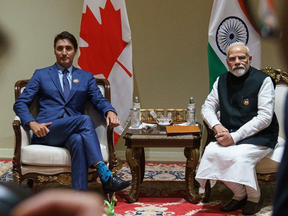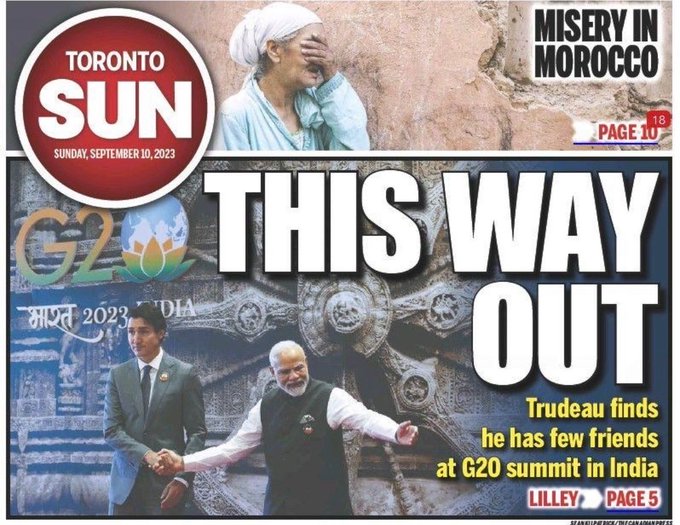The Master of Cynical Sanctimony
"As always, we will emphasize how important the rule of law is.""[It is important] to protect Canadians from any and all types of interference.""Yes, China and Russia are responsible for interference [in Canadian politics], but other countries engage in it as well. [The newly-installed commission into foreign interference in Canadian politics] will go where the facts bring them."Canadian Prime Minister Justin Trudeau
 |
| The official portrait released by the Office of the Prime Minister of Canada following Trudeau’s meeting with Indian Prime Minister Narendra Modi at the G20 summit in New Delhi. Photo by Instagram |
Preparing to set off to the G-20 summit in India, Prime Minister Trudeau sought a meeting with India's Prime Minister Narendra Modi on the margins of the summit. Prime Minister Modi met with other world leaders, for fairly lengthy one-on-one discussions, but he saw fit to grant a ten-minute interview with Canada's prime minister. As a sign of the confidence in which the Canadian government is held by India's government, where other international G-20 guests were conveyed from the airport in limousines befitting their status, a rather elderly, undistinguished vehicle awaited Mr. Trudeau's arrival.
Canada, seeking to disentangle itself as much as possible from trade with China, anticipates an alternate trade agreement with India, now the world's most populous country. Mr. Trudeau had been advised by his national security adviser that India has become a top source of foreign interference in Canada, notably around Canada's Sikh community in support of separatist ambitions in the Indian state of Punjab where Sikh extremists extol the aspiration of Sikh 'Khalistan'.
Canada has had ample experience with separatist sympathies emanating from Quebec separatists going to great lengths, including violence, to attain a separate French nation cutting itself free from Canada. Quebec is the sole province within Canada granted near-autonomy while remaining financially reliant on supposedly equalizing transfer payments extracted from the Western-Canadian province of Alberta which Quebec is otherwise hostile toward.
The G-20 summit agenda was intended to focus on climate change, food security, global energy needs, gender equality and Ukraine's Russian invasion. An issue of importance to New Delhi is that Sikh extremists living in Canada have been interfering in Indian domestic affairs, most particularly relating to the Khalistani separatist movement. So while the government of Canada has had its experience with Quebec separatism, the Indian government is struggling with secessionist Sikh aspirations.
And Canada's experience with terrorism was originally that of Quebec violent separatist terrorists in early 1980 while, in 1985, Canadian Sikh terrorists were responsible for an explosion aboard an Air India flight carrying mostly Canadian citizens travelling to India as an act of murderous sabotage meant to impress upon India the lengths that Sikh extremists were willing to go to force the Indian government to agree to a geographic division of its territory. The bomb they placed on the passenger jet killed all 329 people aboard.
Now, all these years later, Canadian Sikh extremists are still fulminating for a Khalistan 'homeland' in India's Punjab province. Justin Trudeau defends their right to 'freedom of expression' as a Canadian virtue. Yet when discontented Canadians fed up with the government-imposed COVID mandates on masking and vaccinations travelled in a huge truck convoy to Ottawa to protest their perception that their rights were being trampled on, Trudeau refused to meet with them, labelled them contemptible misfits and racists. Their freedom of speech criticizing government was not respected.
In India during Trudeau's second official trip to India, following his disgraceful, clownish performance on the first trip meant to be a trade mission, but one which embarrassed both India and Canada in Trudeau's foppish theatrics, and his impossibly ignorant faux pas by accepting in his retinue the presence of a Sikh Canadian who had been found guilty of attempted murder of a visiting Indian politician, insulting India in the process.
The Indian press was not impressed with the presence of Trudeau on his second trip. The Hindustan Times wrote of "Trudeau's India Agony". The English-language NewsX cable channel denounced Trudeau for the ignorant hypocrite that he is: "Like any good Punjabi I have family in Canada, and I promise you that the nonsense that you're talking is emanating from sheer hubris. What do we do with this man?" rhetorically asked anchor Rishabh Gulati.
India's Ministry of External Affairs issued a statement following the short meeting between Trudeau and Indian Prime Minister Narendra Modi, indicating that most of the encounter had Mr. Modi reprimanding Trudeau for allowing Canada to become a safe haven for secessionist extremists: "They are ... inciting violence against Indian diplomats, damaging diplomatic premises, and threatening the Indian community in Canada and their places of worship", read the statement.
The issue of Khalistan, the Sikh secessionist movement seeking to separate 'Khalistan' from the Punjab remains the single most aggravating issue responsible for tense relations between the two governments. Canada has become a hotbed of Khalistan extremism following the Air India bombing, planned and perpetrated by Khalistani terrorists based in British Columbia.
After Prime Minister Modi's demands that Trudeau crack down on radical Khalistani activities, reporters in New Delhi were informed by Trudeau that while Canada was "always there" to prevent violence, it was his intention to defend "freedom of expression, freedom of conscience, and peaceful protest", as though Canadians fed up with the miserable governance they have been subjected to by Trudeau's Liberal government, who complain about his inept government and the impoverishment of the country under his rule, are given respectful hearings.

Labels: Canadian Prime Minister Justin Trudeau, Canadian Sikh Separatists, G-20 Summit, Indian Prime Minister Narendra Modi
0 Comments:
Post a Comment
<< Home